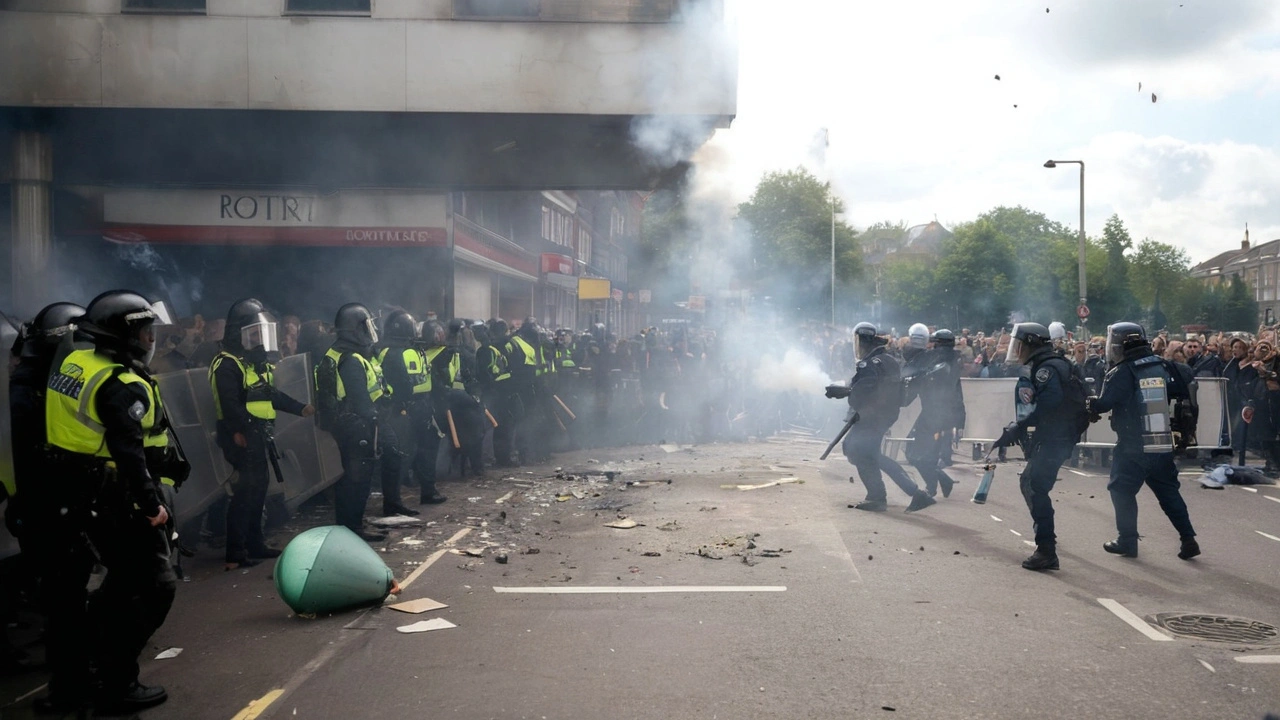
Unpacking the Recent UK Riots: The Role of Far-Right Groups
Recent riots in the United Kingdom have caught international attention as urban areas in several regions have been gripped by waves of violence and unrest. A crucial element in understanding these events is the escalating involvement of far-right groups, whose participation has significantly intensified the turmoil. These extremist factions are widely recognized for their incendiary ideologies and aggressive tactics, which have led to rising tensions and numerous confrontations.
Several specific incidents underscore the considerable impact far-right groups have had on the course of these riots. For instance, in cities like London and Birmingham, demonstrators associated with these groups were seen not only taking part in the unrest but also directing aggressive acts towards others, further inflaming already volatile situations. Their activities often include clashes with anti-racism protesters, vandalism, and violence directed at law enforcement agencies. This pattern of behavior has created serious concerns among citizens and officials alike.
Law Enforcement and Government Response
The intensified involvement of these groups has pushed law enforcement and government officials to take decisive actions to manage the situation and prevent further escalation. Police forces across the country have been mobilized extensively, deploying tactical units and increasing their presence in key areas to quell violence and protect citizens. Arrests have been made in significant numbers, with many of those detained being linked to extremist groups. Law enforcement's strategy includes both reactive measures, such as dispersing violent mobs, and proactive efforts, such as social media monitoring to preempt organized attacks.
Government reaction has been multifaceted, with officials condemning the violence and underscoring the necessity of maintaining public order. Parliament has engaged in intense discussions on the topic, debating measures that could effectively address the root causes of the unrest while simultaneously ensuring security. They have called for a unified approach, involving various arms of government and civil society organizations, to tackle the influence of extremist ideologies.

Insights from Experts and Analysts
To provide a deeper understanding of the underlying factors that have contributed to these riots, the article incorporates insights from political analysts and social experts. According to Dr. Helena Carter, a renowned sociologist, the growth of far-right groups is partly fueled by socioeconomic disparities and a perceived sense of disenfranchisement among certain segments of the population. This perception often leads people to gravitate towards extremist ideologies, which promise simple solutions to complex problems.
Political analysts like James Thompson emphasize the role of misinformation and radicalization facilitated through online platforms. These forums often serve as hotbeds for far-right ideologies, where individuals are exposed to a continual stream of hate-filled rhetoric and conspiracy theories. Consequently, an increasing number of people become radicalized, and these online interactions translate to real-world actions during episodes of unrest.
Key Figures and Organizations
Notable figures and organizations have been named as central to the unfolding events. Prominent among them are leaders of far-right entities, many of whom openly advocate for confrontational and often violent approaches to achieving their objectives. Statements from these leaders frequently reflect an antagonistic stance towards both governmental bodies and opposing protesters, further exacerbating divisions within society.
In direct opposition, a number of community leaders and human rights organizations have spoken out against these far-right factions. They advocate for peaceful dialogue and a collective effort to address the systemic issues that contribute to civil distress. These voices stress the importance of unity and the role of inclusive policies in mitigating the appeal of extremist ideologies.
Long-Term Consequences and Solutions
The potential long-term consequences of this unrest are profound, influencing not only immediate public safety but also the broader social and political landscape of the UK. Persistent violence and instability could undermine public confidence in institutions, further polarizing communities and exacerbating existing social rifts. The economic implications could also be significant, with ongoing disturbances discouraging investment and affecting the livelihoods of those in affected areas.
Efforts to address the core issues driving this violence are underway. Government initiatives aim to promote social integration and economic opportunities for marginalized communities, addressing some of the root causes of disenfranchisement. Simultaneously, there is a growing call for stricter regulations on online platforms to curb the spread of extremist content. Community-based programs are also being encouraged, fostering dialogue and understanding among diverse groups to build cohesive and resilient communities.
In conclusion, the recent UK riots underscore the critical need for a comprehensive and cohesive strategy to address the far-right extremism fueling these events. By understanding the multifaceted factors at play and working towards inclusive solutions, it may be possible to mitigate future unrest and promote a more harmonious society.





